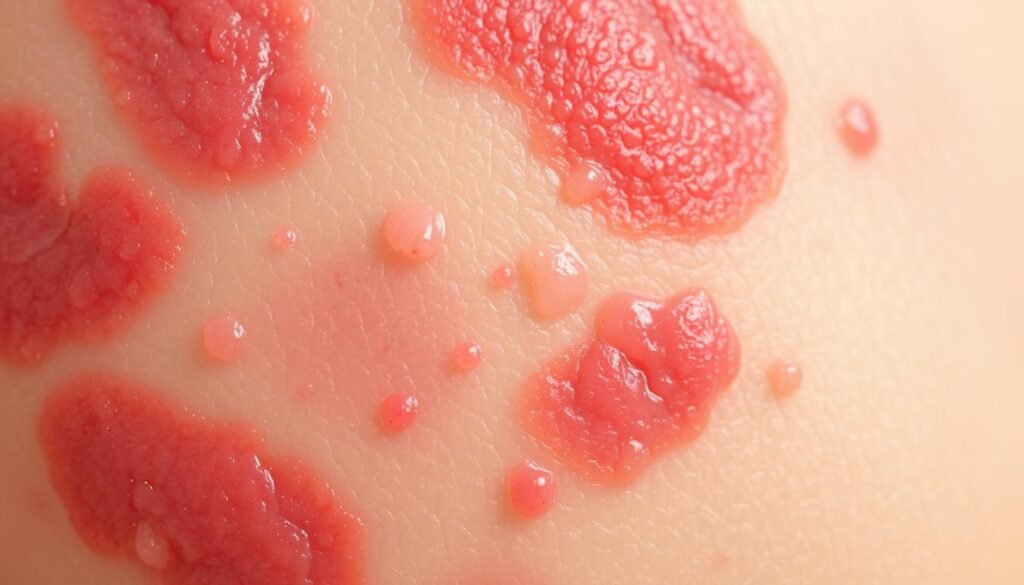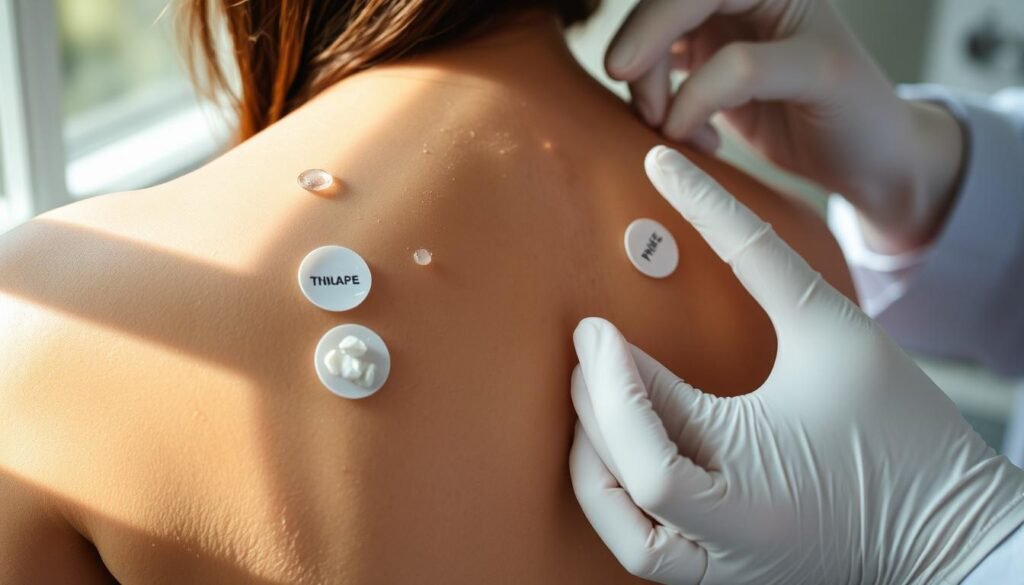Did you know allergic eczema comes from touching many things each day? Yet, only a few cause big immune reactions. This condition, also called contact dermatitis, creates an itchy skin rash. It can greatly lower someone’s quality of life. Spotting eczema signs early is vital.
They might look like intense itch, burning, or rough skin patches. Knowing what can cause allergic eczema is key to managing it. This can be things in the environment or stress. With the correct eczema treatment, we can stop it from coming back and keep skin healthy.
Key Takeaways
- Allergic eczema stems from contact with various allergens, making awareness key.
- Common symptoms include itching, burning, and rough skin.
- Identifying triggers helps in preventing future allergic reactions.
- Treatment options range from over-the-counter remedies to prescription medications.
- Proper management can lead to significant symptom relief within weeks.
- Stress and environmental factors can exacerbate flare-ups.
Overview of Allergic Eczema
Eczema, or allergic eczema, is a skin condition that does not spread by touch. It affects a lot of people. About 10 to 20% of kids and 2 to 5% of adults show symptoms of this issue. It usually starts in babies between 3 and 6 months old. In babies, it shows up mostly on the cheeks and arms and legs. But in older kids, teens, and adults, it usually appears on the knees, elbows, and neck.
Allergic dermatitis, a common type of eczema, happens when the immune system overreacts to allergens. This reaction causes skin inflammation. In cases of atopic eczema, about 30-40% of sufferers experience these immune responses. If kids get eczema between 2 and 5 years old, it might stick around longer. But many see their symptoms improve or even go away in their teen years.
There’s a strong link between eczema and other allergies. Many kids with eczema may also get asthma or hay fever later. The numbers range from 30% to 80%. Both genetics and the environment play a part in developing eczema. If allergies or asthma run in your family, you might be more likely to get eczema.
What Causes Allergic Eczema?
It’s key to know why allergic eczema happens for managing and stopping it. This eczema comes from being exposed to certain allergens. These allergens kick-start an immune response. It’s important to find out what these triggers are, as they differ for everyone.
Common Allergens and Triggers
Various common things can start allergic eczema. Some examples are:
- Nickel found in jewelry
- Fragrances in cosmetics
- Certain plants, like poison ivy
- Soaps and detergents used every day
- Latex
People with eczema often react to stuff in their environment, too. Things like dust mites, pet fur, and mold can also cause problems. By staying away from these, individuals can lower their eczema chances.
Delayed Allergy Reaction
Allergic eczema has a delayed reaction. Symptoms might not show right away after touching allergens. They can take hours or days to show up. This delay makes finding out and treating it harder. Paying close attention to skin reactions over time helps in managing the condition.
Recognizing the Symptoms of Allergic Eczema
Knowing how to spot eczema symptoms is key to getting the right help. It helps individuals find medical advice early and make needed lifestyle shifts. Symptoms vary but share common signs, often triggered by specific allergens.
Common Symptoms Experienced
Common skin rash signs of allergic eczema are:
- Intense allergic eczema itching that won’t stop
- Redness and swelling where affected
- Dry, scaly spots that might peel or crack
- Small bumps that can ooze or form crusts if scratched
In kids, these signs usually pop up on the face, scalp, arms, and legs. Older kids often spot eczema on their elbows’ insides and knees’ backs. Some might see symptoms all over, showing why correct diagnosis and treatment matter a lot.
Variability in Symptoms
Allergic eczema’s signs can greatly vary from person to person. What affects this includes:
- Being around allergens
- How one cares for their skin
- Their overall health and stress
Changes in these areas can increase or reduce symptoms of dermatitis. This shows why it’s crucial to adjust how we treat it. For more details on handling eczema symptoms, check out these in-depth guidelines on treatment.

| Common Symptoms | Description |
|---|---|
| Itching | Intense and constant urge to scratch. |
| Redness | Swelling that makes skin look discolored. |
| Dryness | Skin gets flaky and rough from lack of water. |
| Bumps | Tiny raised spots leaking fluid when scratched. |
Diagnosis of Allergic Eczema
Diagnosing allergic eczema calls for an in-depth examination. The process includes looking into patient history, doing tests, and applying medical know-how. It often starts with identifying what triggers the condition. Methods like patch testing and skin biopsies are key to understanding a person’s skin health.
Patch Testing for Allergies
Patch testing stands as a proven way to figure out allergies. In this method, small amounts of possible allergens are placed on the skin, usually on the back. The skin is then watched for any reactions over a few days. This approach is vital for pinpointing the exact allergens that cause skin issues.
Doctors usually ask patients to come back several times. They need to check how the skin reacts to the test substances over time.
Biopsy for Differential Diagnosis
Sometimes, patch testing doesn’t give clear answers. When that happens, a biopsy might be needed. This simple procedure takes a small piece of skin to examine in a lab. It helps exclude other skin problems, ensuring the diagnosis is correct. The results, which take about three to seven days, help provide more insight into what’s causing eczema.

| Diagnostic Method | Purpose | Typical Duration |
|---|---|---|
| Patch Testing | Identify specific allergens causing dermatitis | Several visits over 1 week |
| Eczema Biopsy | Rule out other skin conditions | 3 to 7 days for results |
Treatment Options for Allergic Eczema
Treating allergic eczema means using both OTC and prescription meds. The choice depends on how severe your eczema is. Both types together can lessen eczema’s main signs: dry and itchy skin.
Over-the-Counter Treatments
If your eczema is mild, you might manage well with OTC options. These focus on keeping skin moist and lowering redness. The go-tos are:
- Hydrocortisone creams to ease irritation and itchiness
- Moisturizers, used twice a day to keep skin moist
- Oral antihistamines like Diphenhydramine and Cetirizine for itch relief
- Medicated shampoos for conditions like seborrheic dermatitis
For tougher eczema, creams with calcineurin inhibitors like tacrolimus and pimecrolimus help. New options, including PDE4 inhibitors like crisaborole and JAK inhibitors such as Opzelura, are also available.
Prescription Medications
With severe eczema, doctors might suggest prescription meds. Topical corticosteroids are common and help calm and soothe your skin. In tough cases, injectable corticosteroids might be used.
New treatments being developed look promising for eczema care. They aim at making life better for those with allergic eczema. It shows hope for effectively solving the discomfort eczema brings.

| Treatment Type | Examples | Usage |
|---|---|---|
| OTC Treatments | Hydrocortisone creams, moisturizers, oral antihistamines | As needed for mild symptoms |
| Prescription Medications | Topical corticosteroids, injectable corticosteroids | For moderate to severe eczema |
| Advanced Treatments | PDE4 inhibitors, JAK inhibitors | As recommended for treatment-resistant eczema |
Managing Allergic Eczema Flare-Ups
To manage eczema flare-ups well, you need a good plan. This includes skin care, avoiding things that make it worse, and reducing stress. It’s crucial to moisturize daily and choose skin-care products wisely to prevent dryness.
When eczema gets worse, following your treatment plan is key. Not using enough moisturizers can cause more problems. Topical steroids help control eczema. Most people apply them once at night for 7-14 days. Using the right amount is important, especially for treating small skin areas.
Keeping a symptom diary is smart for managing allergic eczema. It helps doctors see how bad your flare-ups are and what’s causing them. Avoiding things like certain foods, wool, and polyester can prevent future problems. Knowing what triggers your eczema is critical for stopping flare-ups before they start.
- Consider clothing choices to avoid rough or tight fabrics.
- Monitor environmental factors like dust and smoke.
- Practice stress management techniques to reduce anxiety linked to flare-ups.
If eczema is bad and creams don’t help, doctors might suggest other treatments. Injectable meds or something like upadacitinib can ease itch fast. Support from family and friends is also helpful for your mental health during these times.
Taking care of yourself is crucial when eczema flares up. Eat well, drink plenty of water, get enough sleep, and relax. Knowing how to treat your eczema effectively helps you manage symptoms and heal quicker.
Impact of Stress on Allergic Eczema
Stress is crucial in how severe allergic eczema can get. Knowing how stress relates to eczema flares helps manage it better. Stress triggers for eczema include job stress, social fears, and feeling upset. It’s vital to recognize these triggers to lessen eczema’s itch and redness.
Eczema Stress Triggers
In 2020, a survey called Eczema Unmasked was done. It showed stress is a top cause for eczema, especially in women,
with 57% saying so. Big changes in life add to stress and make eczema worse. Things like moving, job changes, or tests can make emotions run high. This can lead to more skin problems.
The Mind-Body Connection
Studies show our minds and bodies are closely linked in eczema cases. Feelings like worry or sadness can make skin issues worse. More than 30% of people with atopic dermatitis also struggle with mental health. So, tackling both emotional and skin problems is key. Getting psychological help can make a big difference. It shows treating both the mind and skin is essential for better health.
Using stress relief methods is important for eczema sufferers. Try fun activities, relaxing practices, and making friends who support you. Sleep is also key to healing; missing just one night can make things worse. Focusing on self-care and knowing what causes your stress can help you deal better. For tips on handling stress and eczema, visit WebMD.
Coping Strategies for Eczema Patients
Dealing with eczema is more than just handling the itch. It’s also about managing stress for better health. Using techniques like mindfulness and exercise can reduce stress and improve your skin. Therapy can be a great help too. It lets patients share their feelings and learn to live with eczema.
Stress Management Techniques
There are many ways to handle stress linked to eczema. Activities like yoga and meditation bring calmness. Exercise makes you stronger, helps you sleep better, and lowers anxiety. The EczemaWise app, by the NEA, is also useful. It tracks your eczema to find what helps. Having a daily skin care routine helps keep your skin clear.
Emotional Impact of Eczema
Eczema’s emotional toll is huge. Over 30 million Americans have eczema, feeling isolated and upset. It can harm self-esteem and lead to depression. Being part of a support group helps. It’s a space to share and learn from others with eczema. Support makes you feel less alone and can make treatment better.
Conclusion
Allergic eczema affects many people, with about 31.6 million in the U.S. alone. Knowing what causes it and how to manage it is vital. Figuring out the main allergens and spotting symptoms early can improve life for those with eczema.
There are many treatments for eczema, from simple creams to new drugs like dupilumab (Dupixent) and tralokinumab-ldrm (Adbry). These FDA-approved options give hope, even though there’s no cure yet. Learning coping skills helps reduce eczema’s impact on daily life.
The rise in eczema cases, especially in kids, highlights the need for education and action. People can live better by knowing more and using the right resources. This way, they can tackle symptoms and enjoy a fuller, healthier life.